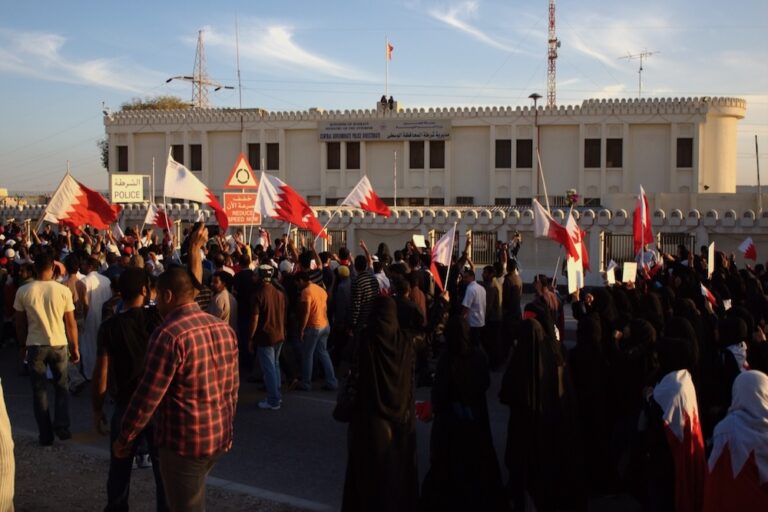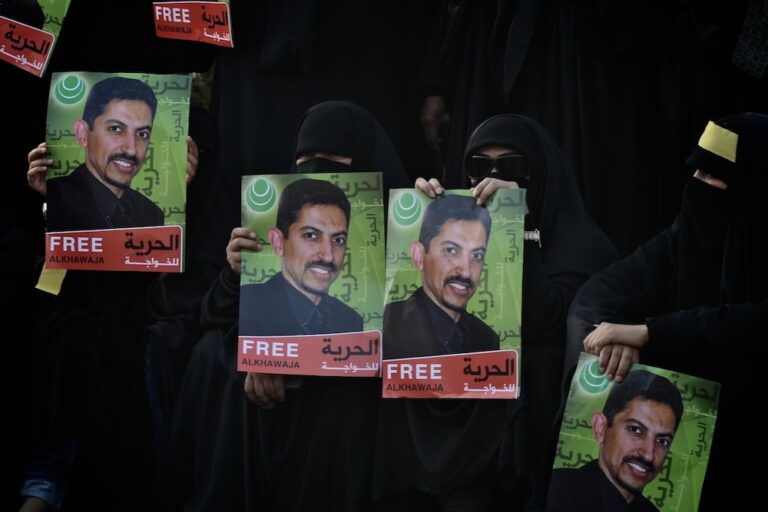A Bahraini court sentenced 50 human rights defenders and activists to prison sentences ranging from 5 to 15 years, while simultaneously reducing the sentences of two police officers accused of torture.
On 29 September 2013, a Bahraini court sentenced 50 activists and human rights defenders to a total of 430 years in prison and upheld the 10-year-sentences against two children. All sentences were delivered under the international criticized terrorism law. The court also reduced the sentences of two police officers accused of torturing a detainee to death from 10 years in prison to two years. The Bahrain Center for Human Rights is gravely concerned over the politically motivated charges and sentences handed down to the dissidents, and it urgently calls for an end to Bahrain’s biased judicial system.
The case of these Bahraini activists is better known as the “February 14 Coalition”; it includes human rights defender Naji Fateel, political activist Hisham Al-Sabbagh, and activist Rihanna Al-Mosawi. The first court session was held on 11 June 2013 at the Fourth Criminal Court, a newly established court headed by Ali Al-Dhahrani, son of the head of Parliament, Hamad Al-Khalifa, a member of the royal family, and Jasim Al-Ajlan.
The case lacked the basic standards of a fair trial and that was apparent from the very first session when defendants spoke up about the torture they were subjected to and were ignored.
On 5 September, the legal defense team submitted a letter requesting a change of court due to conflict of interest, and requested a medical committee to investigate the defendants’ torture allegations. The defense team then withdrew from the session based on Article 211 of the Criminal Procedure Law of Bahrain, which states that the defense team can refuse the judge’s ruling in certain cases prescribed by the law. Moreover, the defendants issued a statement boycotting the trial stating that the lack of an independent judiciary as one of the reasons.
On 29 September, the court continued the sham trial and sentenced the 50 defendants in the case; 16 defendants were sentenced to 15 years’ imprisonment including Naji Fateel and political activist Hisham Al-Sabbag, 4 were sentenced to 10 years imprisonment and 30 to 5 years. A full list of names and sentences can be found here.
BCHR’s acting president Maryam Al-Khawaja stated: “There was no due process in the entirety of this case which is why the defendants and their lawyers decided to boycott. From the time that the defendants were abducted, tortured and then sentences, nothing was done according to international standards of a fair trial. If these fifty people were really guilty of a crime, why was the only evidence presented confessions extracted under torture? This was a sham trial with a political verdict, they should be released immediately”.
The children Jihad Sadeq, 17-years-old, and Mohammed Al-Meqdad, 16-years-old, were arrested on 23 July 2012 from Bilad Al-Qadeem. They were subjected to enforced disappearance for nearly 48 hours before they were allowed to contact their families. They were interrogated without a lawyer and were reportedly subjected to ill-treatment and torture both during arrest and interrogation. Both children stated that they were forced to make false confessions. They were tried and charged as adults under the terrorism law on charges of “intent to commit murder”, “burning a police car”, “illegal gathering and rioting”, “throwing Molotov cocktails” and “attempting to steal a police car”. On 4 April, the High Criminal Court sentenced both children to 10 years’ imprisonment.
On 29 September 2013, the Cassation Court upheld the sentence of 10 years in prison against both Jihad and Mohammed. They are serving their sentence in adults prison with adult detainees.
In another case, four defendants, Mohammed AbdulAmeer Mushaima, Jassim Khalil Al-Saffar, Meqdad Al-Jazeeri and Hussain AbdulGhani, were sentenced to 10 years in prison on the same day for criminal arson – burning a vehicle – under the terrorism law. It was reported that prior to Meqdad Al-Jazeeri’s arrest, he was asked to work as a spy on human rights defenders for the Ministry of Interior (MOI) and when he refused, the officer told him that he will be charged. They were all reportedly tortured in the Criminal Investigation Directorate (CID).
Meanwhile, the authorities continued their policy of impunity towards security forces. Five police officers were accused in the beating that lead to the death of another detainee, Ali Saqer. The court found two of them guilty in the death of Saqer and sentenced them to 10 years in prison. The officers have not attended their ruling, and were not detained. The court reduced the sentences of the two officers charged with torture leading to death in custody from 10 years to two years in prison despite the fact that the Bahrain Independent Commission of Inquiry (BICI) concluded in its report about this case that, “the death of Mr. Ali is attributed to torture at the Dry Dock Detention Centre. Mr. Ali was in the custody of the MOI at the time of his death.”
BCHR believes that the sentences issued on 29 September are unfair and in absolute violation of fair trial international standards. The harsh and baseless verdicts are clearly politically motivated against dissents and activists, while sentences against security forces and MOI personnel are reinforcing the authorities’ policy of fostering a culture of impunity towards human rights violations including torture and killing committed by members of the security forces.
BCHR calls on the United States, the United Kingdom, the United Nations and all other close allies and relevant international institutions to pressure the government of Bahrain to:
- Immediately and unconditionally release the political detainees in the case of the “February 14th Coalition”, the children Jehad and Ebrahim’s case, and all other political prisoners in Bahrain.
- End the practice of sham trials and politically motivated sentences and charges.
- End the culture of impunity, and bring those responsible for the protection of criminals to justice including the officials at the public prosecution.


